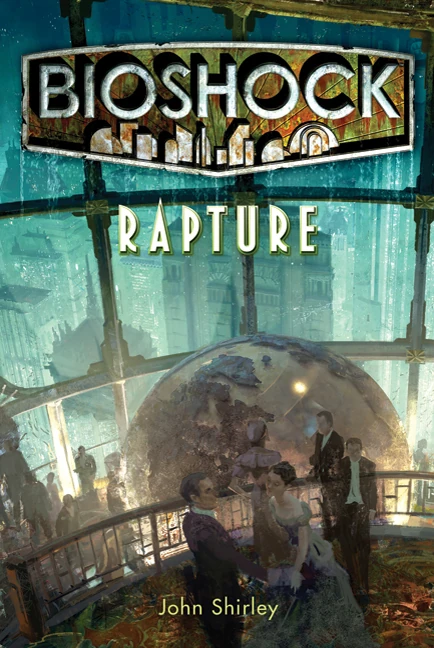Author: John Shirley
Date Read: May 13th 2018
Published: July 19th 2011 @ Tor Books
Genre: Adult Science Fiction
Rating: ⭐⭐
"I believe in no God, no invisible man in the sky. But there is something more powerful than each of us, a combination of our efforts, a Great Chain of industry that unites us. But it is only when we struggle in our own interest that the chain pulls society in the right direction. The chain is too powerful and too mysterious for any government to guide. Any man who tells you different either has his hand in your pocket, or a pistol to your neck."
Bioshock: Rapture is a novel based on the Bioshock video game franchise, a first person shooter set in 1960. After his plane crashes in the Mid Atlantic, sole survivor Jack finds himself in a strange lighthouse that boasts a banner reading "No Gods or Kings. Only Man." This lighthouse leads him to the sunken metropolis of Rapture, a city built at the bottom of the sea by the enigmatic tycoon Andrew Ryan, who sought to escape what he deemed to be a collapsing humanity following the Second World War.
In Bioshock: Rapture, Shirley attempts to expand on this mythology by giving a detailed account of the creation of Rapture and its subsequent fall from grace, leading up to the events of the first game and bridging the gap between Bioshock and its sequel.
In Bioshock: Rapture, Shirley attempts to expand on this mythology by giving a detailed account of the creation of Rapture and its subsequent fall from grace, leading up to the events of the first game and bridging the gap between Bioshock and its sequel.
I hated the first 70% of this story. It follows several different viewpoints during the inception and creation of Rapture, from Andrew Ryan himself to the maintenance workers to con men attempting to infiltrate the city. Despite attempts to endear us to Bill (a plumber with higher aspirations who is taken under Ryan's wing) and set up the world, it felt so disconnected and flat that it was a chore to read. Which is saying a lot considering how invested I am in the mythology of the source material. Still, because of that love for the game that started my interest in video games, I felt an obligation to see this through.
I think my real issue is that the prose was entirely bereft of style. So much of what makes the Bioshock franchise so successful is in the atmosphere, and the way that imagery plays into the story’s overall themes, and I felt none of that from the writing. There is no gumption to the moral debates of social responsibility, nor any real feeling for the city which, as we've seen in flashbacks during the games, was a bustling organism in its own right. Shirley simply tells us what happened in the construction of Rapture. Ryan does this, Bill says this, Frank swindles that. It’s all so... surface level, if you’ll excuse the underwater city pun. Basically all of the wow-worthy lines were lifted word-for-word from the games.
I do appreciate Shirley's challenge in that there were definitely times in the games where logic and suspension of disbelief gives way to aesthetics, but unfortunately, I just don't think this novel rose to the task of assimilating those two things. And to be honest, there were certain elements of video game logic, such as the ability to pop back up at your last save point after dying, that I don't think needed to be addressed as though they had to be part of the mythos.
I do appreciate Shirley's challenge in that there were definitely times in the games where logic and suspension of disbelief gives way to aesthetics, but unfortunately, I just don't think this novel rose to the task of assimilating those two things. And to be honest, there were certain elements of video game logic, such as the ability to pop back up at your last save point after dying, that I don't think needed to be addressed as though they had to be part of the mythos.
It definitely picks up toward the end, as the action requires a lot more detailed descriptions, and I think the final two or three scenes are thematically resonant, but I don’t think it was enough to bring up the overall rating for me.
So, this book was ok. If you’re as in love with the source material as I am, you might enjoy the familiarity of events, but I don’t think I would recommend it if you aren’t. And even then... maybe just go play the game again.



No comments:
Post a Comment